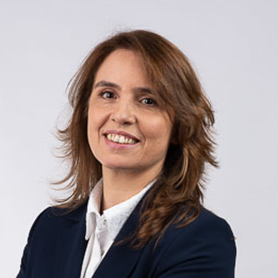Raquel Passos Miranda: With a Sustainable Business, Everybody Wins
Raquel Passos Miranda is a firm believer in the relationship between continuous improvement and sustainability. As Sustainability & Continuous Improvement Director at Colep Packaging she talks to dss+ about why an open culture and building strong relationships are vital for sustainability success.


Raquel Passos Miranda
Sustainability & Continuous Improvement Director, Colep Packaging, Portugal
Q.
You have experience in the supply chain, business development and continuous improvement. How have these roles influenced your current position in sustainability?
I worked for many years in the supply chain but then decided to change direction so took an MBA and started to work in business development and continuous improvement. I joined Colep in 2013 to help build a culture of operational excellence and began working on the design for a continuous improvement system, that involved aligning the improvements with the strategic objectives and ensuring the sustainability of results. The system’s success meant it was implemented in every plant globally, and I was ready for a new challenge. In 2020 I was invited to take on the role of developing Colep Packaging sustainability model and policies with the ambition of pursuing long-term prosperity, integrating sustainability at the core of our business and strategy. So, there were significant synergies between sustainability and my previous position as both are embedded in business processes, involving the entire organization. The two go hand in hand. Connecting sustainability to the heart of the company and engaging our people and other stakeholders has been an important first step. While it’s a challenge, it’s also a privilege to take the company lead on such an important topic for all of us.
Q.
How can company culture and good leadership make a difference when creating sustainable value?
To create sustainable value, it’s critical to have everyone on board and not just rely on leadership. Encouraging an open culture that focuses on teamwork, preparation and training allows everyone to play their part. Good leadership means supporting and challenging each team member, helping them to thrive, leveraging their knowledge, engagement and autonomy. So, it’s less about being directive and more about encouraging and guiding team members to come up with their own decisions. Unfortunately, there is no one-size-fits-all for inspiring others to change their behaviours, so you need resilience to try a range of approaches that resonate with different people. This cultural shift takes time, but it’s imperative to adapt behaviours and mindsets to respond to the complex and systemic challenges we face. With a sustainable business, everybody wins, value is created and shared with all stakeholders.
"Sustainability is a complex and global topic, and everyone has a role to play. As someone once said, we need everyone to address everything."
– Raquel Passos Miranda, Sustainability & Continuous Improvement Director, Colep Packaging, Portugal
Q.
As we search for better business solutions, how can technology give a competitive edge in reaching sustainability goals?
I think technology’s impact is twofold. Companies that pursue sustainability are more likely to improve processes and equipment efficiency and are also able to develop innovative products and services that offer a better value proposition to customers and consumers. For example, Colep Packaging develops products that use less materials while at the same time ensure functionality and content safety. In most cases, this has an economic and environmental impact that goes beyond the packaging itself. We also encourage the development of reusable and recyclable packaging, reducing waste generation and participating in the circular economy by increasing the incorporation of recycled material such as steel which has recycling rates of 84% in Europe and helps leverage our value proposition. But it’s not just about the product. Adopting new technologies improves efficiency and reimages the operating model to avoid wasting resources in the manufacturing, supply chain, and post-consumption phase. This broader view of technology to improve products and the business model not only adds value but also gives a competitive edge that opens the door to new business opportunities.
Q.
How do you engage the wider company in helping to create a sustainable business?
To have an impact and be successful, sustainability requires a systematic approach that captures inputs across the company. To ensure diversity, we developed a sustainability committee with members from other areas to define the main activities that support the sustainability roadmap and the communication topics we should focus on. This committee is composed of people from safety, continuous improvement, human resources, commercial, operations, supply chain, among others. We see each one of them as crucial to ensuring the quality of the proposed activities. My primary role is to both support and challenge the committee. This involves training and guidance on implementing sustainability measures across the business. At our stage of sustainability maturity, the committee is also the right place where people can bring new projects and ideas which we can assess and prioritise. Sustainability is a complex and global topic, and everyone has a role to play. As someone once said, we need everyone to address everything.
"Adopting new technologies improves efficiency and reimages the operating model to avoid wasting resources in the manufacturing, supply chain, and post-consumption phase."
– Raquel Passos Miranda, Sustainability & Continuous Improvement Director, Colep Packaging, Portugal
Q.
There are many challenges in moving to a low carbon and more sustainable future. What is vital to success?
Achieving a low carbon future requires an enormous global movement. Companies are currently at different stages of sustainability maturity and need to acquire the knowledge and get the necessary funding to advance their journey. We still have several industries that rely on fossil fuels and need to transform assets at an unprecedented speed. Plus, many technical and innovative solutions are still not feasible on an industrial scale. Then there are scope 3 emissions associated with our supply chain; these are difficult to measure and hard to reduce since it requires complex stakeholder management, which takes time and resources. Not all solutions are feasible in all locations or businesses, and it requires an analysis for each scenario. This is made more difficult due to the lack of credible information, and too many different standards confuse the organisations. In terms of our challenges, we are working hard with our supply chain to explore more efficient processes. We are also working internally on product development, energy efficiency and are shifting to greener energy. As we all search for solutions, becoming more efficient by using fewer resources is vital and achievable if we have the will to succeed.
"As we all search for solutions, becoming more efficient by using fewer resources is vital and achievable if we have the will to succeed."
– Raquel Passos Miranda, Sustainability & Continuous Improvement Director, Colep Packaging, Portugal
Q.
What would be your top skillsets for creating a sustainable business?
Communication is one of the most critical skills as we need to engage with lots of stakeholders with different profiles internally and externally. Any communication needs to consider who will be reading it and address their needs accordingly, whether it’s at board level, a plant manager or someone on the shop floor. Building relationships is also crucial as any sustainability strategy touches every part of the business, the value chain, partners, local communities and other stakeholders who need to be kept informed and engaged. In addition, collaboration is vital from a knowledge perspective as it requires an understanding of how legislation, the innovation process, energy options and social responsibilities impact the development of sustainability plans. At the same time, it’s essential to inspire and guide stakeholders so there is shared ownership of the sustainability decision-making process, rather than implementing rules from above. Finally, personal accountability is an integral part of sustainability strategies to succeed. We all need to feel we are pushing in the right direction together.